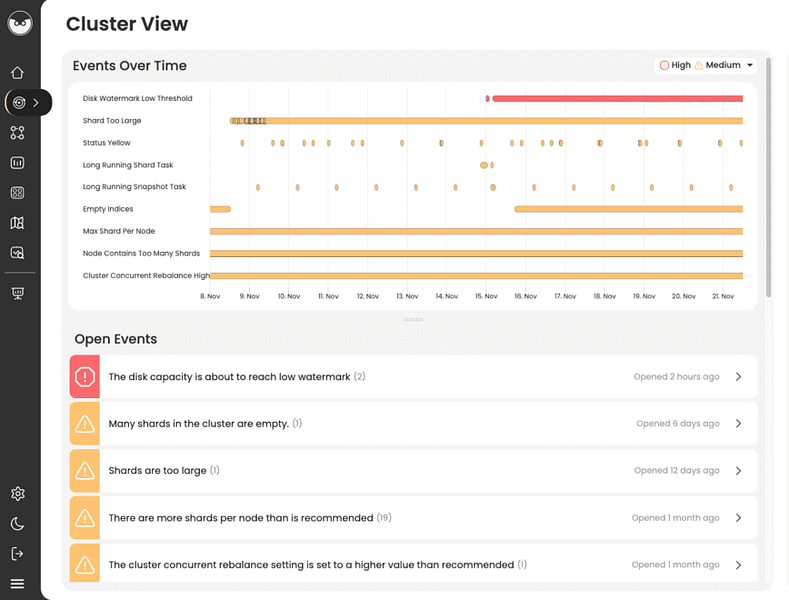Opster Team
Before you begin reading this guide, we recommend you try running the Elasticsearch Error Check-Up which analyzes 2 JSON files to detect many configuration errors.
Briefly, this error occurs when a shard is in a non-primary mode in Elasticsearch. Shards can be in a variety of modes depending on their role in the cluster, and this error is returned when a shard is not in the primary mode. To resolve the issue, check the status of the shard and ensure that it is in the correct mode for its role in the cluster. This may involve reassigning the shard or reconfiguring the cluster.
To easily locate the root cause and resolve this issue try AutoOps for Elasticsearch & OpenSearch. It diagnoses problems by analyzing hundreds of metrics collected by a lightweight agent and offers guidance for resolving them.
Take a self-guided product tour to see for yourself (no registration required).
This guide will help you check for common problems that cause the log ” shard is not in primary mode ” to appear. To understand the issues related to this log, read the explanation below about the following Elasticsearch concepts: replication and shard.
Overview
Replication refers to storing a redundant copy of the data. Starting from version 7.x, Elasticsearch creates one primary shard with a replication factor set to 1. Replicas never get assigned to the same node on which primary shards are assigned, which means you should have at least two nodes in the cluster to assign the replicas. If a primary shard goes down, the replica automatically acts as a primary shard.
What it is used for
Replicas are used to provide high availability and failover. A higher number of replicas is also helpful for faster searches.
Examples
Update replica count
PUT /api-logs/_settings?pretty
{
"index" : {
"number_of_replicas" : 2
}
}Common problems
- By default, new replicas are not assigned to nodes with more than 85% disk usage. Instead, Elasticsearch throws a warning.
- Creating too many replicas may cause a problem if there are not enough resources available in the cluster.
Log Context
Log “shard is not in primary mode”classname is TransportReplicationAction.java We extracted the following from Elasticsearch source code for those seeking an in-depth context :
primaryRequest.getRequest();
ActionListener.wrap(
releasable -> runWithPrimaryShardReference(new PrimaryShardReference(indexShard; releasable));
e -> {
if (e instanceof ShardNotInPrimaryModeException) {
onFailure(new ReplicationOperation.RetryOnPrimaryException(shardId; "shard is not in primary mode"; e));
} else {
onFailure(e);
}
}));
}
Find & fix Elasticsearch problems
Opster AutoOps diagnoses & fixes issues in Elasticsearch based on analyzing hundreds of metrics.
Fix Your Cluster IssuesConnect in under 2 minutes

Arpit Ghiya
Senior Lead SRE at Coupa





